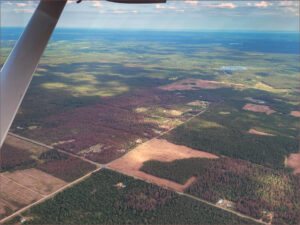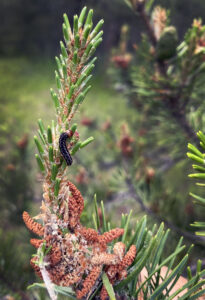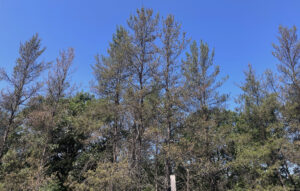By Paul Cigan, DNR Forest Health Specialist, Hayward
Paul.Cigan@wisconsin.gov or 715-416-4920

Aerial view of jack pine budworm defoliation in jack pine stands in Douglas County during the 2023 outbreak. / Photo Credit: Paul Cigan, Wisconsin DNR
Jack pine defoliation caused by the jack pine budworm (JPBW) continued at mostly light levels this year, affecting stands in the Central and Northwest Sands Ecological Regions of Wisconsin.
In the Northwest Sands, jack pine stands experienced light and scattered defoliation across Burnett, Douglas, Polk and Washburn counties. In the Central Sands, JPBW caused moderate to heavy defoliation across roughly 500 acres of jack pine on county and state forests in Jackson County, east of Black River Falls.

Jack pine budworm larvae feeding on current-year jack pine shoots with characteristic, clipped and fading needles and silken strands at the base of the shoot. / Photo Credit: Paul Cigan, Wisconsin DNR
Northwest counties saw a significant decrease in defoliation intensity and extent compared to 2023, when an irruptive outbreak of JPBW caused heavy defoliation across roughly 79,000 acres. Locally building JPBW populations since 2021 coincided with a flash drought beginning in May 2023 and led to Wisconsin’s largest regional outbreak of this native defoliator in nearly 20 years.
Outbreaks of JPBW typically last 2 to 4 years, but frequent and intense precipitation events during May and June 2024 significantly reduced budworm activity, and only light mortality of jack pine occupying poor quality sites resulted from the 2023 outbreak.
Management of jack pine budworm in the affected areas should include monitoring defoliated stands and considering clearcut harvests when defoliation caused 10-15% top kill and 5% tree mortality. More details on JPBW biology, impacts, prevention and silvicultural management can be found in the recently released Wisconsin Department of Natural Resources (DNR) fact sheet on jack pine budworm.

Jack pine with off-green colored and diffuse-looking foliage caused by jack pine budworm feeding injury. / Photo Credit: Michael Hillstrom, Wisconsin DNR
